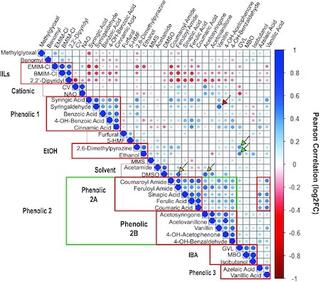Comparative chemical genomic profiling across plant-based hydrolysate toxins reveals widespread antagonism in fitness contributions
E. Vanacloig-Pedros et al. "Comparative chemical genomic profiling across plant-based hydrolysate toxins reveals widespread antagonism in fitness contributions" FEMS Yeast Research 21 (2021) [DOI: 10.1093/femsyr/foac036]
The budding yeast Saccharomyces cerevisiae has been used extensively in fermentative industrial processes, including biofuel production from sustainable plant-based hydrolysates. Myriad toxins and stressors found in hydrolysates inhibit microbial metabolism and product formation. Overcoming these stresses requires mitigation strategies that include strain engineering. To identify shared and divergent mechanisms of toxicity and to implicate gene targets for genetic engineering, we used a chemical genomic approach to study fitness effects across a library of S. cerevisiae deletion mutants cultured anaerobically in dozens of individual compounds found in different types of hydrolysates. Relationships in chemical genomic profiles identified classes of toxins that provoked similar cellular responses, spanning inhibitor relationships that were not expected from chemical classification. Our results also revealed widespread antagonistic effects across inhibitors, such that the same gene deletions were beneficial for surviving some toxins but detrimental for others. This work presents a rich dataset relating gene function to chemical compounds, which both expands our understanding of plant-based hydrolysates and provides a useful resource to identify engineering targets.
